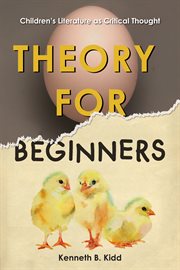Nonfiction
eBook
Details
PUBLISHED
Made available through hoopla
DESCRIPTION
1 online resource
ISBN/ISSN
LANGUAGE
NOTES
After centuries of ignoring the child, some philosophy now considers the child an ideal practitioner as well as the subject. This is evident especially in the Philosophy for Children, or P4C, movement. Offering a novel take on this phenomenon, Theory for Beginners explores how philosophy and theory draw on children's literature and have even come to resemble it in their strategies for cultivating the child and/or the beginner. Since its inception in the 1970s, P4C has affirmed children's literature as important philosophical work as part of its commitment to keeping philosophy fresh and relevant. Theory, meanwhile, has invested in children's classics, especially Lewis Carroll's Alice books, and has also developed a literature for beginners that resembles children's literature in significant ways. After examining the P4C movement, author Kenneth B. Kidd turns his critical eye to theory for beginners as exemplified in the form of the multitude of illustrated guides. If philosophy is for children and theory is for beginners, he argues, then children's literature might also be described as a literature for minors, and perhaps even a minor literature as theorized by Deleuze and Guattari. Examining everything from the work of the rise of French Theory in the United States to the crucial pedagogies offered in children's picture books, from Alison Bechdel's graphic memoir Are You My Mother? and Lemony Snicket's A Series of Unfortunate Events to studies of queer childhood, Kidd deftly reveals the way in which children may learn from philosophy and vice versa
Mode of access: World Wide Web







